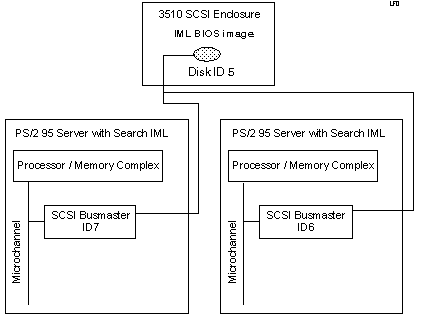|
Twin Tailing
Limits
Twin Tailing and Search IML (Enhanced BIOS)
Twin Tailing
Twin-Tailing is the term used to refer to attaching one or more disks to two
servers. It has the potential for sharing data and for increasing availability,
but this is only hardware-level support for twin-tailing, which can be used for
read-only files. Software support would need to be added to ensure that the
same file was not being written to, at the same time, by both systems.
Limitations (may be dated)
The main limitation of twin-tailing on PS/2s, currently, is
that file sharing has to be controlled either by the application or by
the system design.
- Designate one server as the primary server, and allow only this server to
write to the shared disks. Both servers can read from the disks. There is still
the risk that data will have been updated in disk cache on the primary server
and not yet written to the common disks.
- If the disks are accessed only in read mode by both servers during normal
operation, then there is no risk of corrupt or out-of-date data.
Twin-Tailing and Search IML
Search IML also enables twin-tailing to be implemented with two PS/2 Model
95s and a common IPL disk (held, for example, in a 3510 or 3511 external
enclosure). Twin-tailing provides the ability for a disk to be shared at a
hardware level between two systems, and is based on the ability for two SCSI
adapters (in different systems) and one or more disks to be attached to a
common SCSI bus. This is shown in the following illustration.

Ed. I think I have the correct answer
for the SCSI bus termination.
T --- SCSI /A | -------- 3510 --------- | SCSI /A ---- T
This ignores any SCSI devices past the SCSI adapters. I *assume* there is no
termination between the systems
Search IML supports twin-tailing by enabling the SCSI adapters to use SCSI
IDs 7 and 6, with the external disk being located on, for example, SCSI ID 5.
Search IML will find and load the IML BIOS on this disk from both systems.
Although both adapters support twin-tailing, the 32-bit IBM SCSI adapters are
able to detect that twin-tailing is in operation, whereas the 16-bit IBM SCSI
adapters are not.
|